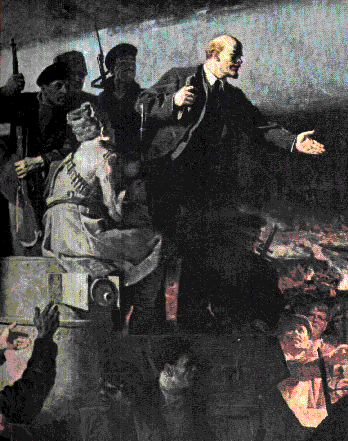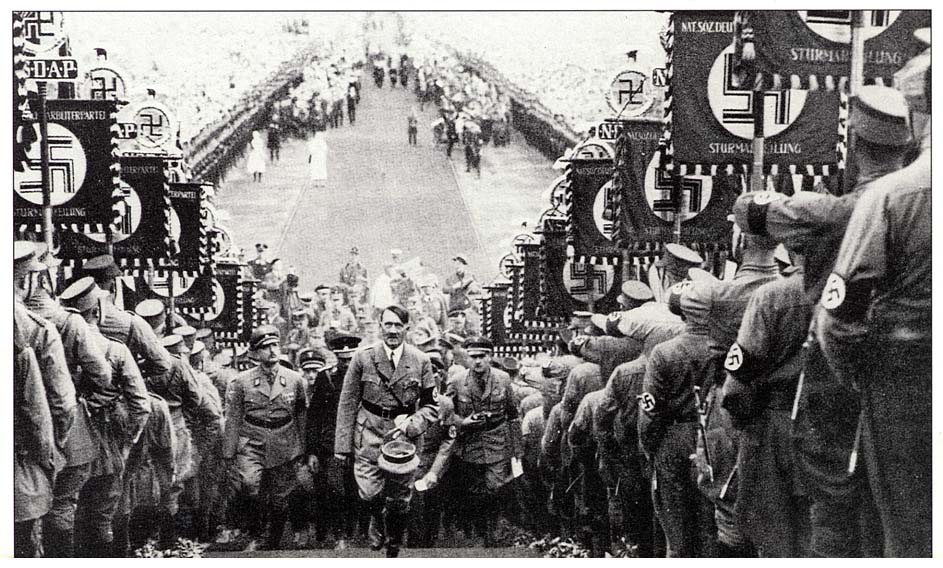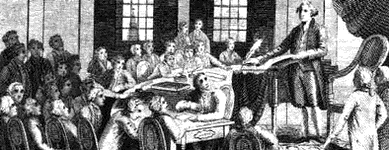


|
|
|
|
|
|
|
|
|
|
|
|
| Professor Mark W. Huddleston
Office: 468 Smith Hall Voice mail: 831-2358 E-mail: mwh@udel.edu |
Spring 1999
MW 0905-0955 104 Gore Hall Office Hours: MW 1000-1130 or by appointment |
 |
 |
 |
| Texts & Resources |
Carl Cohen, Communism, Fascism and Democracy, 3rd Edition
Electronic Reserve Links (under construction)
| Catalog Description |
As the title suggests, this course provides an introduction to contemporary ideologies, with a focus on three systems of thought--liberal democracy, communism, and fascism (or extreme nationalism)--that have, in one form or another, dominated the modern world.
| Course Objectives |
Our main goal this semester is to become familiar with the structuring
assumptions or philosophical underpinnings of each ideology. That is, while
we shall certainly pay some attention to what the ideologues of liberalism,
communism and fascism have to say (to the content of their beliefs),
we shall spend most of our time and energy exploring why they say why they
say (to the origins of their beliefs). This approach will put us
in the company of many of the West's greatest (or most infamous) modern
political thinkers, including Thomas Hobbes, John Locke, Jean-Jacques Rousseau,
G.W.F Hegel, Karl Marx, V.I. Lenin, Mao Zedong, and Adolf Hitler, among
others. By the end of the course, you will have (a) a basic grasp of the
philosophical systems that each of these men propounded, (b) the ability
to compare and contrast the essential elements of each system, (c) an understanding
of how these philosophies shaped political ideologies and political action,
and (d) an enhanced capacity to evaluate the political ideologies that
you encounter in everyday life.
| Grading |
Exams. There will be three hourly exams, administered on March
10th, April 14th, and May 19th (the last day of class). Each exam will
stress the material in the unit immediately preceding it, although the
second two exams will ask some questions may from earlier material.
Grades. Grades will be calculated based on the following weights among requirements:
1st hourly exam - 25%
2nd hourly exam - 25%
3rd hourly exam - 25%
Discussion section part. - 25%
(including WWW page)
Grading Standards. Although the awarding of letter grades necessarily involves a degree of judgment and subjectivity, especially when evaluative instruments other than multiple choice and true/false tests are involved, the process is not arbitrary. This attachment seeks to expand upon the description of letter grades in the Undergraduate Catalogue by describing as specifically as possible what each means in this course.
In general, I use three dimensions in assessing essays (although I do not do so mechanically): responsiveness (how fully and directly did the student answer the question?), structure and coherence (does the argument unfold logically and clearly?), and use of facts (has the student made appropriate use of all relevant facts?). A typical "C" range answer is one that is workman-like on these dimensions: It answers the questions with a structured response composed of relevant facts. "B" range answers are generally superior, "D" range answers generally deficient on these dimensions. "A" range answers are truly excellent across the board, while "Fís" are awarded in cases that simply donít make the grade on any dimension.
What follows in as effort to explain in plain language these standards
further, and to articulate more subtle distinctions in these ranges. Numbers
are included in parentheses only to explain how quiz averages will be converted
to letter grades; essays will be awarded letter grades, not numerical scores.
A (94-100) Excellent. Truly distinguished performance. Outstandingly clear, coherent, and persuasive writing. Absolute mastery of facts. Displays originality of thought, especially in integration of material. Fully pursues questions and their implications.
A- (90-93) Nearly excellent. Meets "A" standards on all but one dimension.
B+ (88-89) Superior. Very high level of responsiveness and unusual comprehension. Essays especially well organized and well-written. Full command of facts.
B (84-87) Very good. Well-above average. Complete understanding
of material and demonstrated ability to make connections between various
ideas. Fully answers questions. Very clear and coherent writing. Use of
facts beyond minimum required to answer question.
B- (80-83) Good. Above average, but not quite a clear "B" because of a slight deficiency on some dimension. Understands material fully. Generally well-written essays. Focuses on questions with no meandering. No major errors or omissions of fact.
C+ (78-79) Fair plus. A little more than average, but not by much. Answers questions as asked. Good use of major facts, though with some omissions. Essays show solid structure and coherence.
C (74-77) Fair. Average. Essays display basic structure. Answers questions as asked, but without pursuing implications fully. Major points covered with only minor errors of fact.
C- (70-73) Slightly below average. Some deficiencies in presentation and writing. Covers most major points, but neglects some that are important. Factual errors.
D+ (68-69) Poor plus. Generally awarded when there is a glimmer of hope in responsiveness, structure, comprehension, or use of facts in an otherwise poor, "D" performance.
D (64-67) Poor. Some structure, but overall poorly organized and badly written. Rambles. Seeks to answer question, but misses major points. Significant factual errors. Little evidence of comprehension.
D- (60-63) Very poor. Lowest possible passing grade. Meets some but not all of the "D" standards.
F (59 and below) Failure. Neglects to answer questions. Massive errors of fact. Nearly incomprehensible presentation. Virtually no evidence of learning.
| Class Schedule |
| February 10 | The Nature of Ideology
No readings |
| February 15 | From Medieval to Modern Political Thought
No readings |
| February 17 | Thomas Hobbes
The Leviathan (Cohen, 38) |
| February 22 | John Locke
Second Treatise of Government (Cohen, 66) |
| February 24 | John Jacques Rousseau
The Social Contract (Cohen, 67) |
| March 1 | Liberalism in America: James Madison
The Federalist Papers #10 3 Cohen, 74) |
| March 3 | Liberalism in America: Thomas Jefferson
The Declaration of Independence and Selected Letters (Cohen 68) |
| March 8 | Conservatism and Liberalism
Edmund Burke, Speech to the Electors of Bristol (Cohen, 75) John Calhoun, A Disquisition on Government (Cohen, 77) Milton Friedman, Capitalism and Freedom (Cohen, 86) |
| March 10 | FIRST HOURLY EXAM |
| March 15 | Utopian Socialism
Friedrich Engels, Socialism, Utopian and Scientific (Cohen, 1) Henri Comte de Saint-Simon, Selected Writings (Cohen, 2) F.M. Charles Fourier, Selected Writings (Cohen, 3) Robert Owen, The Book of the New Moral World (Cohen, 4) |
| March 17 | G.W.F. Hegel
Hegel, Lectures on the Philosophy of History (Cohen, 6) Hegel, The Philosophy of Law (Cohen, 39) Friedrich Engels, Letter to Conrad Schmidt (Cohen, 7) |
| March 22 | Foundations of Marxism
Karl Marx, Economic and Philosophical Manuscripts (Cohen, 8) Marx & Engels, The German Ideology (Cohen, 9) Marx & Engels, The Communist Maniesto (Cohen 13) |
| March 24 | Marx and Capitalism
Karl Marx, Capital (Cohen, 15) |
| March 26-April 4 | SPRING BREAK! |
| April 5 | V.I. Lenin
Imperialism: The Highest Stage of Capitalism (Cohen, 18) State and Revolution (Cohen 21 & 30) Left Wing Communism: An Infantile Disorder (Cohen, 31) |
| April 7 | Joseph Stalin and the Soviet Experience
Stalin, The Foundations of Leninism (Cohen, 23 & 32) Leon Trotsky, The Permanent Revolution (Cohen, 24) N. Khrushchev, We Will Bury You (Cohen, 27) |
| April 12 | Mao Zedong and Chinese Communism
Selected Writings (Cohen, 19 & 33) Quotations from Chairman Mao (Cohen, 25) |
| April 14 | SECOND HOURLY EXAM |
| April 19 | The Roots of Fascism
Johann Fichte, Addresses to the German Nation (Cohen 40) Heinrich von Treitschke, Politics (Cohen, 41) Georges Sorel, Letter to Daniel Halevy (Cohen, 43) Friedrich Nietzsche, Beyond Good and Evil (Cohen, 45) |
| April 19 & 21 | Benito Mussolini and Italian Fascism
Alfredo Rocco, The Political Doctrine of Fascism (Cohen, 49) Benito Mussolini, The Doctrine of Fascism (Cohen, 50) Giovanni Gentile, The Philosophic Basis of Fascism (Cohen, 51) Mario Palmieri, The Philosophy of Fascism (Cohen, 52) The National Fascist Party and The Charter of Labor (Cohen, 53) The Fascist Decalogue (Cohen, 54) |
| April 26 & 28 | Adolph Hitler and German National Socialism
Richard Wagner, Rebirth of the German Spirit (Cohen, 44) Herman Goring, Germany Reborn (Cohen, 55) Alfred Rosenberg, The Myth of the Twentieth Century (Cohen, 56) Ernst Huber, Constitutional Law of the Greater German Reich (Cohen, 57) Adolph Hitler, Mein Kampf (Cohen, 58) |
| May 3 & 5 | Fundamentalist Islam
Bernard Lewis, "The Roots of Muslim Rage," The Atlantic Monthly September 1990) |
| May 10 & 12 | Nationalism & Fascism: Bosnia and Kosovo
Henry Louis Gates, "Blood and Irony," The Economist (electronic reserve) |
| May 17 | Ideology and the 21st century/web-page
presentations
Glenn Tinder, "Can We Be Good Without God?" The Atlantic Monthly December 1989) Francis Fukuyama, "The End of History," The National Interest (Summer 1989) (electronic reserve) |
| May 19 | THIRD HOURLY EXAM |
| Class Format |
Generally speaking, the format of the course entails lectures on Mondays and Wednesdays, and small group discussions on Fridays. I am always happy to answer questions and to engage in at least limited discussion during the Monday and Wednesday lectures. In fact, if you have a question about the material, I'd prefer that you raise your hand during class: The odds are, if you don't understand something, others in the class are in the same boat.
| Project Assignments |
Each student will participate in a group web-page design project. Your assignment, working with other members of your discussion section, is to:
| PowerPoint Outlines |
| Policy on Student Class Attendance |
Attendance at all lectures is strongly encouraged. Attendance at (and participation in) all discussion sections is required.
Please be respectful of other students and the instructors. Treat class
as an opportunity to learn--not to chat with your neighbors or read newspapers.
University of Delaware Libraries
Last Updated: [CURRENT DATE]